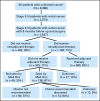Postoperative adjuvant chemotherapy use in patients with stage II/III rectal cancer treated with neoadjuvant therapy: a national comprehensive cancer network analysis
- PMID: 23169502
- PMCID: PMC5950500
- DOI: 10.1200/JCO.2011.40.3188
Postoperative adjuvant chemotherapy use in patients with stage II/III rectal cancer treated with neoadjuvant therapy: a national comprehensive cancer network analysis
Abstract
Purpose: Practice guidelines recommend that patients who receive neoadjuvant chemotherapy and radiation for locally advanced rectal cancer complete postoperative adjuvant systemic chemotherapy, irrespective of tumor downstaging.
Patients and methods: The National Comprehensive Cancer Network (NCCN) Colorectal Cancer Database tracks longitudinal care for patients treated at eight specialty cancer centers across the United States and was used to evaluate how frequently patients with rectal cancer who were treated with neoadjuvant chemotherapy also received postoperative systemic chemotherapy. Patient and tumor characteristics were examined in a multivariable logistic regression model.
Results: Between September 2005 and December 2010, 2,073 patients with stage II/III rectal cancer were enrolled in the database. Of these, 1,193 patients receiving neoadjuvant chemoradiotherapy were in the analysis, including 203 patients not receiving any adjuvant chemotherapy. For those seen by a medical oncologist, the most frequent reason chemotherapy was not recommended was comorbid illness (25 of 50, 50%); the most frequent reason chemotherapy was not received even though it was recommended or discussed was patient refusal (54 of 74, 73%). After controlling for NCCN Cancer Center and clinical TNM stage in a multivariable logistic model, factors significantly associated with not receiving adjuvant chemotherapy were age, Eastern Cooperative Oncology Group performance status ≥ 1, on Medicaid or indigent compared with private insurance, complete pathologic response, presence of re-operation/wound infection, and no closure of ileostomy/colostomy.
Conclusion: Even at specialty cancer centers, a sizeable minority of patients with rectal cancer treated with curative-intent neoadjuvant chemoradiotherapy do not complete postoperative chemotherapy. Strategies to facilitate the ability to complete this third and final component of curative intent treatment are necessary.
Conflict of interest statement
Authors' disclosures of potential conflicts of interest and author contributions are found at the end of this article.
Figures
References
-
- Jemal A Siegel R Ward E, etal: Cancer statistics, 2009 CA Cancer J Clin 59:225–249,2009 - PubMed
-
- Bosset JF Collette L Calais G, etal: Chemotherapy with preoperative radiotherapy in rectal cancer N Engl J Med 355:1114–1123,2006 - PubMed
-
- Chan AK Wong AO Langevin J, etal: Preoperative chemotherapy and pelvic radiation for tethered or fixed rectal cancer: A phase II dose escalation study Int J Radiat Oncol Biol Phys 48:843–856,2000 - PubMed
-
- Collette L Bosset JF den Dulk M, etal: Patients with curative resection of cT3-4 rectal cancer after preoperative radiotherapy or radiochemotherapy: Does anybody benefit from adjuvant fluorouracil-based chemotherapy? A trial of the European Organisation for Research and Treatment of Cancer Radiation Oncology Group J Clin Oncol 25:4379–4386,2007 - PubMed
-
- Das P Skibber JM Rodriguez-Bigas MA, etal: Clinical and pathologic predictors of locoregional recurrence, distant metastasis, and overall survival in patients treated with chemoradiation and mesorectal excision for rectal cancer Am J Clin Oncol 29:219–224,2006 - PubMed
MeSH terms
LinkOut - more resources
Full Text Sources
Other Literature Sources


